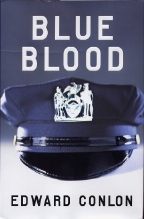Blue Blood
Edward Conlon
Riverhead Books/Penguin Group
US Hardcover First
ISBN: 1-57322-266-6
559 Pages; $28.95
Publication Date: April, 2004
Date Reviewed: May 10, 2004
Reviewed by: Terry D'Auray © 2004

REFERENCES
COLUMNS
|
|
|
Blue BloodEdward ConlonRiverhead Books/Penguin GroupUS Hardcover FirstISBN: 1-57322-266-6559 Pages; $28.95Publication Date: April, 2004Date Reviewed: May 10, 2004Reviewed by: Terry D'Auray © 2004 |
|
|
REFERENCES |
COLUMNS |
Edward Conlon is an Irish Catholic cop in New York; his father was also an NYPD cop before moving to the FBI; his uncle was a cop; and his great grandfather was also a cop - a crooked cop. Like the three generations before him, Conlon felt the allure of walking the beat in one of the toughest jobs out there. Unlike his ancestors, Conlon joined NYPD after earning a Harvard degree and working a number of ultimately unsatisfying jobs. And unlike his ancestors, Conlon can tell the sweeping story of the day-to-day life of a cop in lyrical prose and perceptive, clearly authentic, detail.
'Blue Blood' is the story of Conlon's seven years in the NYPD, beginning in the late 90s in the Guiliani era with his trip through the police academy, followed by his rookie years patrolling the projects in the South Bronx, then to his assignment to Narcotics and ultimately, to his promotion to Detective. 'Blue Blood' is an extensive collection of anecdotes born from misadventure, vignettes and recollections mixed with historical perspective and contemporary ethics, all presented with persuasive believability. It's an astonishing achievement in its thoroughness and its scope, more astonishing because it was written while Conlon was still on active duty with the NYPD, in his "spare time" on a job that's 24/7.
Story by story, recollection by recollection, Conlon chronicles the cop's world. He describes the horrific - a starved old woman abused by her family to keep their hands on her Social Security check. He describes the hysterical - Conlon, gun holstered with only a broom in hand, pursuing a psycho-cat through the tight confines of a project apartment. And he describes the grim - sifting through the debris of the World Trade Center at a foul-smelling Staten Island garbage dump for identifying tags, and for bones. His anecdotes are in turn gross, funny, or frustrating, sometimes hopeful and oftentimes sad.
A self-described loner, but not a misfit, Conlon describes the genuine collegiality of the cop fraternity, the quirks and eccentricities that characterize the relationships among the diverse group of men, women, blacks, whites and Hispanics of the NYPD. He translates the arcane, almost incomprehensible jargon of cop-talk and the myriad bureaucratic procedures, rules, and regulations that form the cop's life. Swamped in acronyms, buried in paperwork, organized, re-organized, re-re-organized, faced with unwieldy schedules, inflexible attitudes and political minefields, cops are easily isolated from all but each other - the "blue wall of silence". Conlon writes with equal skill whether he's outlining the structure of drug deals on the streets (with look-outs, steerers, pitchers and phantom buyers) or describing the mandatory phrasing required when calling in sick. Having "a cold" is not acceptable; having "flue-like symptoms" is. And, with an irrepressible nose-thumb at the brass, Conlon tries, and almost gets away with, calling in with "Dutch Elm disease".
'Blue Blood' is not just a collection of recollections. Conlon mixes a law-enforcement history lesson with his chronicle of the day-to-day. The reader learns a bit about the illustrious Tammany era, the Knapp Commission, Serpico, the full story of the French Connection (and what the movie got right, and what it didn't), the Guiliani-era drop in crime rates soured by racial confrontations and the growth of the drug trade. Conlon mixes the past with the present to inform both and enhance the reader's understanding of the roots and manifestations of current social challenges and controversies.
Conlon has the Irish gift of storytelling, mixing exposition with wit, descriptions with perceptive insight. The result is a rhythmic and highly readable prose that's in turn funny, poignant, or insightful. Somewhat surprisingly, Conlon's memoir is rarely frightening, never explicitly violent and, despite situations that would seem to invite it, never gritty or gruesome. Though often filled with frustration and failure, 'Blue Blood' is a hopeful narrative, written with a literary style that avoids bitterness or anger and embraces the diversities of the human condition.
'Blue Blood' is an ambitious work of extensive detail and span - a super sized brick of non-fiction. It feels at times expansively vast, overstuffed with names and incidents and anecdotes. Significant and potentially meaty stories are given a quick once over lightly, then immediately followed by another incident, and yet another. People - fellow cops, perps, informants or department brass - begin to blur and lose focus. I would have traded quantitatively fewer recollections for more flesh on the bones of the ones that remained. In the end, I was in enthralled and awed by Conlon's literary skill, but utterly overwhelmed by his content.